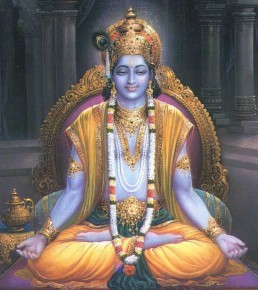Swami Chinmayananda
Swami Chinmayananda Commentary
So far we have a description of the three types of “Knowledge” and “Action.” The third of the constituents that goes into the make-up of an action is the “Doer,” the ego that has the desire to do. Since the three gunas come to influence the psychological life and the intellectual perception of all of us, the doer-personality in each one of us must also change its moods and temperaments according to the preponderant guna that rules the bosom at any given moment of time. Consequently, the “ego” also is classified under three kinds. With this stanza starts the discussion on the three types of “actors” (Kartaa) who act in the world outside.
A Sattwic “Actor” is the one who is free from attachment to any of his kith and kin (Mukta-sangah), and non-egoistic (Anaham vaadin). He is one who has no clinging attachment to the things and beings around, as he has no such false belief that the world outside will bring to him a desirable fulfilment of his existence. He sincerely feels that he has not done anything spectacular even when he has actually done the greatest good to mankind, because he surrenders his ego-centric individuality to the Lord, through his perfect attunement with the Infinite.
When such an individual — who has destroyed in himself his ego-sense and the consequent sense of attachment — works in the worldly fields of activities, he ever acts with firm resolution (Dhriti), and extreme zeal (Utsaha). The term ‘Dhriti’ means “fortitude” — the subtle faculty in man that makes him strive continuously towards a determined goal. When obstacles come his way, it is this faculty of ‘Dhriti’ that discovers for him more and more courage and enthusiasm to face them all, and to continue striving towards the same determined goal. This persevering tendency to push oneself on with the work until one reaches the halls of success, unmindful of the obstacles one might meet with on the path, is called ‘Dhriti’; and ‘Utsaha’ means untiring self-application with dynamic enthusiasm on the path of achievement, while pursuing success.
Lastly, a Sattwic “actor” is one who ever strives unperturbed, both in success and in failure, both in pleasure and in pain. At this moment I can only think of one example of this type of “actor” (Kartaa): the nurse in the hospital. She has generally no attachment to the patient; she has no ego that she is curing the patient, because she knows that there is the ability of the doctor behind every successful cure. She has fortitude (Dhriti) and enthusiasm (Utsaha) — or else she will not be able to continue efficiently in her job. And lastly, she is not concerned with success or failure; she does not rejoice when a patient walks out fully cured, nor does she moan for every patient that dies. She cannot afford such an indulgence. She understands the hospital to be an island of success and failure, of births and deaths, and she is there only to serve.
An “actor” (or agent) of the above type is one who suffers the least dissipation of his energies, and so he successfully manages to bring into the field of his actions the mighty total possibilities of a fully unfolded human personality. The Sattwic “agent” strives joyously in Sattwic “actions,” guided by his Sattwic “knowledge”; his is the most enduring success, and the world of beings is benefited the most by the inexhaustible rewards of the love-labour of such prophets.
A Sattwic Kartaa realises that in all his actions, his body, mind and intellect come into play and serve the world only because the Spirit, the Infinite, is in contact with them. The equipments of matter are as helpless as a broomstick left in a corner. Whenever the body functions, the mind-intellect-equipment throbs and heaves in its pursuit of the new ideals and achievements. And this is because of the Life which thrills them into their respective expressions.
The faculties of the intellect, the beauties of the heart, the vitality of the body, are all vehicles for the Sacred Will of the Spirit to sing through. If the vehicles are not properly disciplined, and if they do not come to surrender totally to the Infinite, the Lord, they get broken and shattered.
A Sattwic “doer” is one who is ever conscious of the touch of the Infinite Light in all his activities.
WHO IS THE RAJASIC “DOER”?
Adi Sankara Commentary
Karta, the agent; who is mukta-sangah, free from attachment-one by whom attachment has been given up; anahamvadi, not egotisic, not given to asserting his ego; dhrti-utsaha-samanvitah, endowed with fortitude and diligenc; and nirvikarah, unperturbed; siddhi-asiddhyoh, by success and failure, in the fruition and non-fruition of any action under-taken-led only by the authority of the scriptures, not by attachment to results etc. [Etc. stands for attachment to work.];-the agent who is such, he is ucyate, said to be; sattvikah, possessed of sattva.
The Bhagavad Gita with the commentary of Sri Sankaracharya – Translated by Alladi Mahadeva Sastry
Holy Geeta – Commentary by Swami Chinmayananda
The Bhagavad Gita by Eknath Easwaran – Best selling translation of the Bhagavad Gita
The Bhagavad Gita – Translation and Commentary by Swami Sivananda
Bhagavad Gita – Translation and Commentary by Bhaktivedanta Swami Prabupadha
Srimad Bhagavad Gita Chapter 18 – Verse 26 – 18.26 muktasango’nahamvadi – All Bhagavad Gita (Geeta) Verses in Sanskrit, English, Transliteration, Word Meaning, Translation, Audio, Shankara Bhashya, Adi Sankaracharya Commentary and Links to Videos by Swami Chinmayananda and others – 18-26

